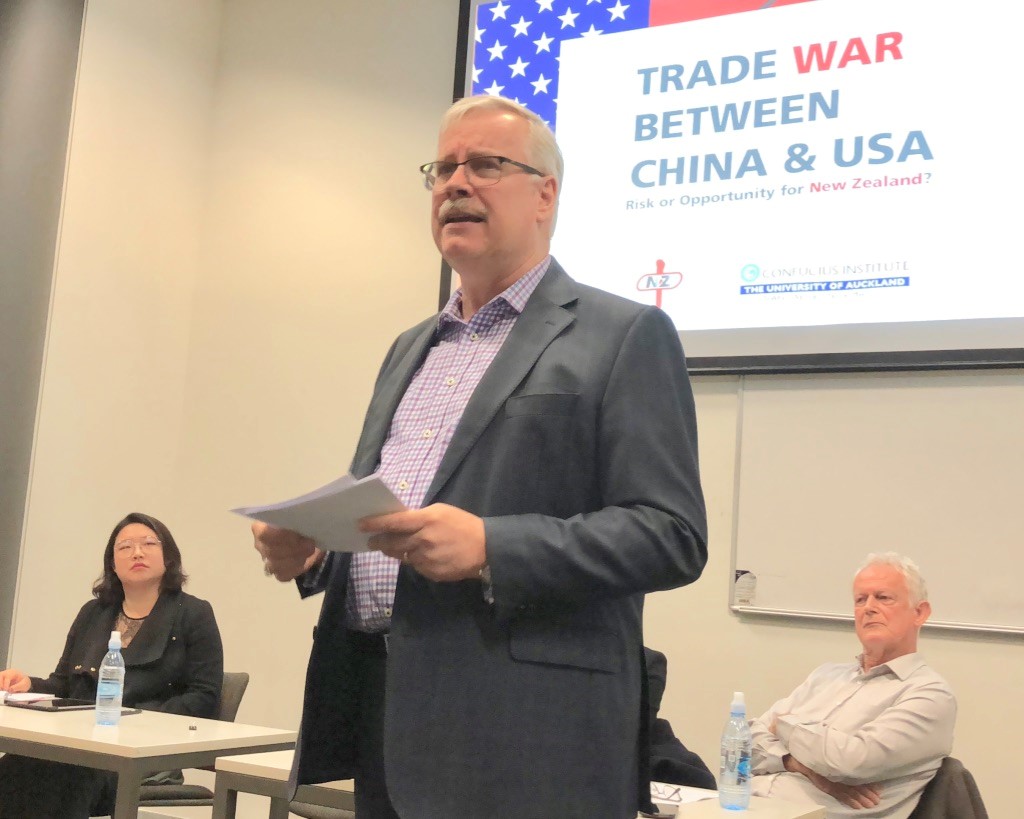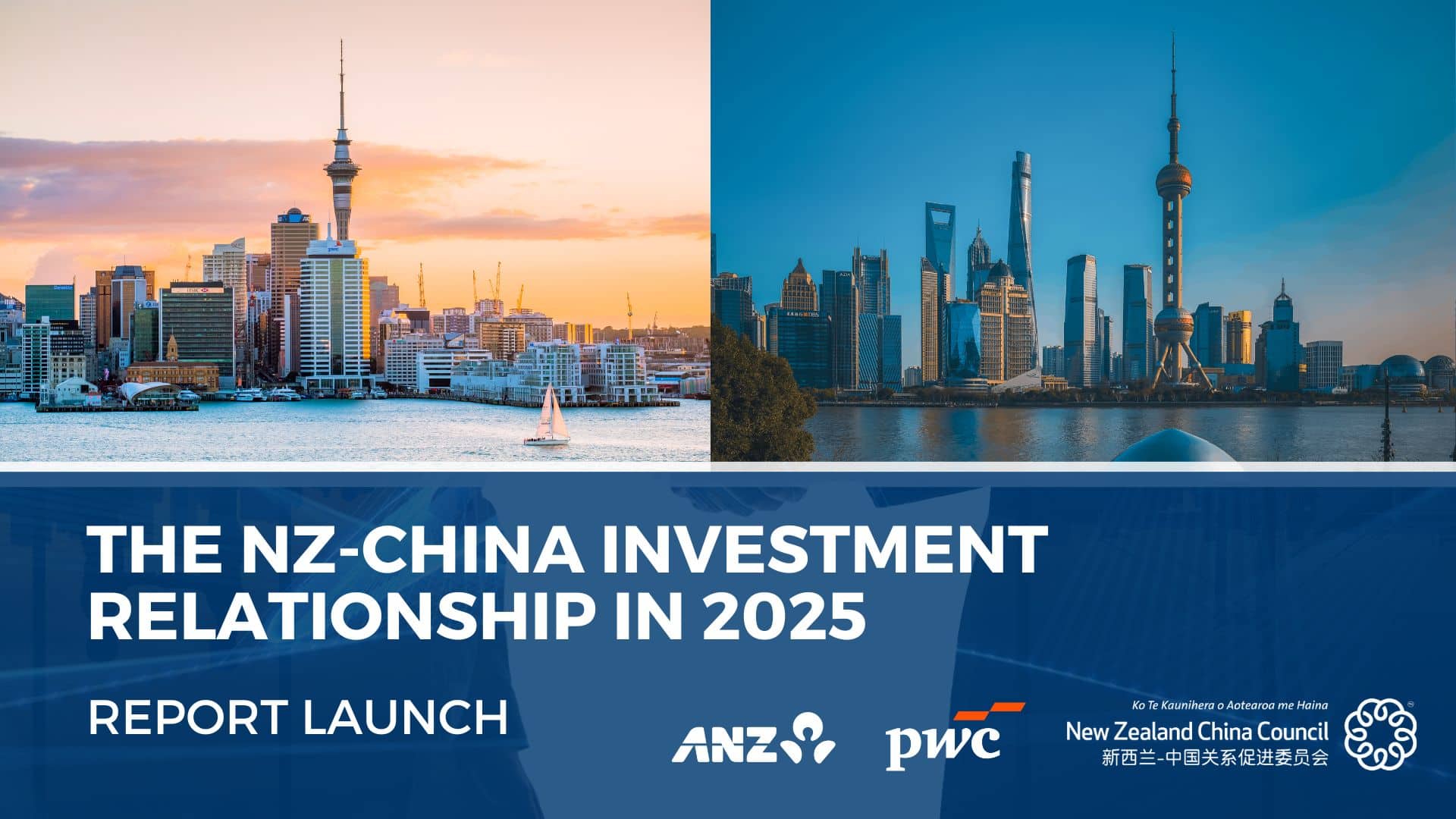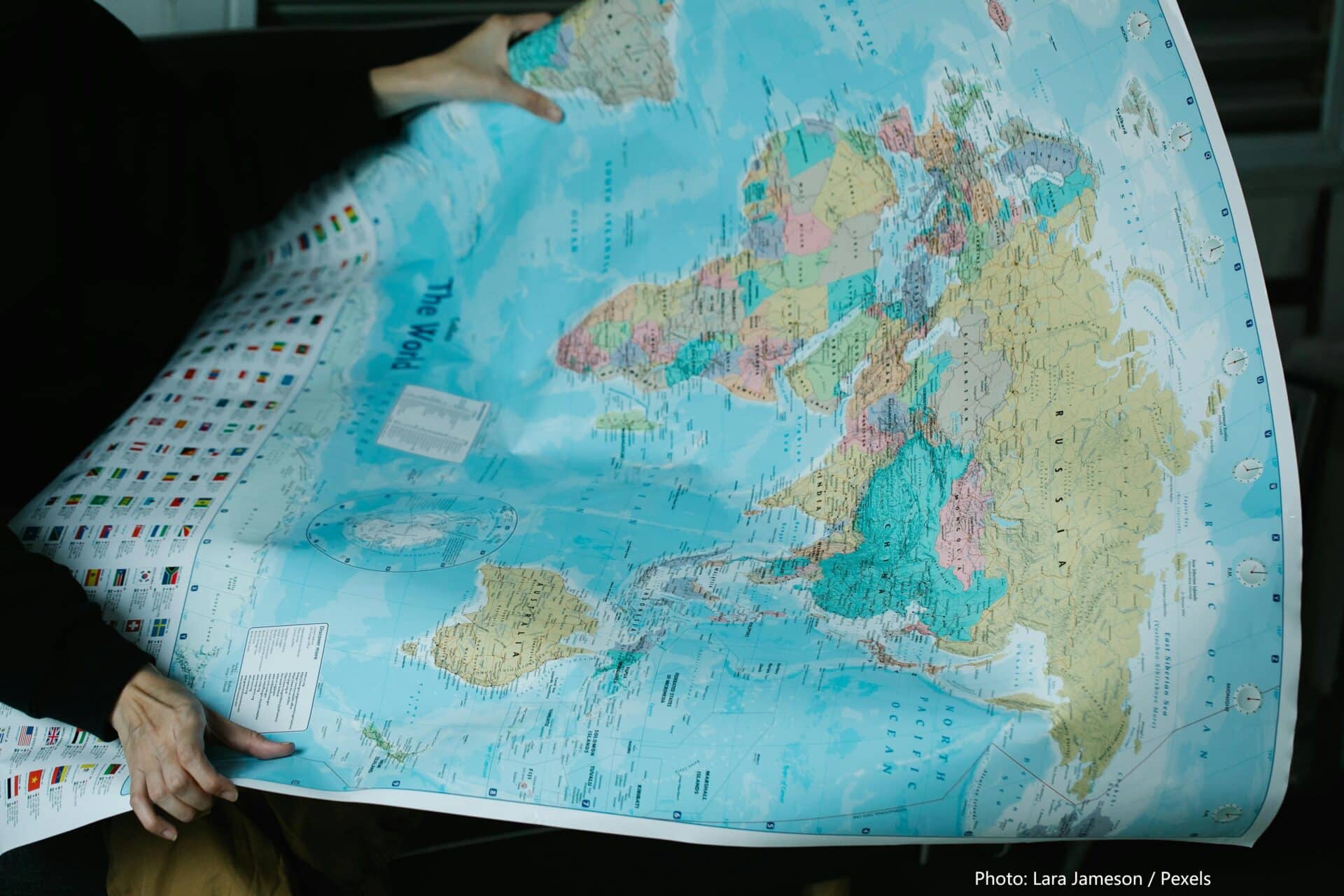US China Trade War – Threat or Opportunity?
Our Executive Director, Stephen Jacobi joined a discussion on trade war between US and China organised by the New Zealand China Friendship Society at the University of Auckland on 29 August. Advisory Board members Dave Bromwich (President of the NZCFS) and Naisi Chen also participated in the discussion.
In his remarks, Stephen said: ”Tonight’s theme draws cleverly on the wisdom of the Chinese word for “crisis” – 危机 wei ji – with its two component parts: wei meaning danger and ji meaning opportunity.”
To find out about what options there are for New Zealand, please read Stephen’s speech below:
“US CHINA TRADE WAR – THREAT OR OPPORTUNITY?”
Thanks to the NZ China Friendship Society for bringing us together this evening.
I am pleased to be here not only as Executive Director of the NZ China Council and convinced of course of the importance of NZ’s relationship with China, but also as someone who led the NZ US Council for almost a decade – I certainly don’t subscribe to an “either-or” view about these two good friends of ours, even if I have grave concerns about the situation now facing us.
I also serve as Executive Director of the NZ International Business Forum which works to promote NZ trade and business interests in all parts of the world.
To paraphrase and amend a recent tweet of a certain US President – “Trade Wars are bad, and no-one wins”.
Tonight’s theme draws cleverly on the wisdom of the Chinese word for “crisis” – 危机 wei ji – with its two component parts: wei meaning danger and ji meaning opportunity.
My message tonight is that there is a lot more danger than opportunity in the current wei ji facing global trade.
I say this for three reasons:
- First, because New Zealand lives by trade and our trading interests are directly involved as markets become destablised
- Second, because although we strive for friendship with both China and the United States, our ability to steer this careful middle path becomes much harder in the current trade war
- And third, because the trade war risks undermining the whole international trading system which we have come to rely on in the last thirty years.
In a somewhat more hopeful note, I do see one small flicker of opportunity – a candle in the darkness if you like which I’ll cover in a moment.
Threat or opportunity?
But first the bad news…
When elephants fight it gets tough on the grass.
No truer word was ever said in relation to a small state’s interests when larger powers fight.
My first point is that New Zealand is already being affected by this trade war:
- Our small volume steel and aluminium exports to the United States are subject to a 25% and 10% tariff respectively on the absurd grounds of national security – so far, our appeal for New Zealand to be excluded has fallen on deaf ears, although we are assured it is being worked on
- We are already feeling the fallout of the trade war in third markets – US agricultural products are being shut out of Chinese markets by China’s retaliatory tariffs and our exporters of dairy, meat and horticultural producers are facing increased competition elsewhere
- The scope of the tariffs currently imposed by the US and China is currently limited, but as this scope widens and more products are caught the impact will be greater.
If it’s potentially bad for us it’s worse for US and Chinese consumers and manufacturers – tariffs are basically a tax on consumers who have to pay more for imported goods and on industries who rely on imported components.
That’s why we are hearing calls for relief from these tariffs especially in the United States as the cost mounts up.
My second point is that New Zealand has close and valuable relationships with both the United States and China.
With the United States, we share a significant history as well as fundamental values and principles – democracy, human rights and a commitment to the market economy.
The US is a major trade and investment partner for New Zealand.
Although no longer defence allies, there is active military co-operation and we are closely aligned on many global political and security issues – a “very, very good friend”, even if we don’t see the world in exactly the same way.
With China, our relationship is newer, but has been built on a firm foundation of mutual interest and mutual respect.
I acknowledge the work of the NZ China Friendship Society in this regard over many years.
Our political values clearly differ from China’s, but that has not stopped us developing an increasingly broad-based partnership in the economy and growing people to people links.
With China too, we have differences from time to time and we try to ensure that we promote both our interests and our values in our bilateral co-operation.
I was told recently that the secret of New Zealand’s foreign policy is never being forced to choose between key partners, but to preserve the freedom to make the choices we need to make in our national interest.
As this trade war intensifies, New Zealand’s ability to manage both these key relationships in a positive way risks becoming harder.
To give one obvious example – the Belt and Road Initiative (BRI) provides an opportunity to inject some new momentum in the relationship with China whereas our US friends remain deeply suspicious about BRI’s geo-political implications.
My third point is that the bigger picture of the trade war risks undermining the very fabric of the international trading system – a system that has been established, largely under the leadership of the United States, over the last thirty years.
The focus for this is the World Trade Organisation (WTO) which not only sets the broad rules for trade but which is the judge and referee when these rules are challenged.
The trade war has already given rise to a large number of WTO disputes and more are likely to follow – that will likely clog the system for some time, preventing other disputes to be heard, including potentially in the future some of direct interest to New Zealand.
The United States has also blocked the appointment of judges to the WTO Appellate Body, which acts as a court of last resort for the dispute settlement system – we risk running out of judges before the end of year which will bring the entire system to a halt.
As a small trading nation, New Zealand relies on the rules of international trade and on the WTO.
We have taken several cases against much larger partners including the US, the EU, Canada, Australia and Indonesia.
We have never lost a case.
The loss of the WTO dispute settlement system would mean a very dark place indeed for world trade and for NZ’s trading interests.
Trade wars are bad and no-one wins …
But I did promise a candle shining in the darkness!
Maybe, just maybe, things will get so close to the brink, that the major players will rediscover both the value of closer, deeper co-operation in the rules based system and the continuing need to reform their economies to promote greater openness and fairer competition.
Yes, this is an appeal to both sides in the trade war.
The United States needs to realise that negotiation is a better answer to the problems it sees in the Chinese market and elsewhere.
And, it needs to be said too, China needs to realise that there are alternatives to a model of economic development based on massive state subsidies and state control of enterprises.
I recognise that I risk satisfying neither side in this debate.
But stepping back from the brink is what is required if the wei is to be offset by the ji in the current crisis.
What options for New Zealand?
Today we are living in what could be described as the best of times and the worst of times.
The worst of times – for the reasons I have just outlined.
The best of times because it is easier today than ever before to trade and do business in all parts of the world.
We have options but one option we don’t have is turn aside from trade: trade is vitally important to our economy.
Put simply, we produce more food than we can eat; we can’t produce all the manufactured and consumer products we need; and our domestic market is small so businesses often need to look to overseas markets to grow.
It is the revenue from exports – and from tourism and international students – that pulses through our economy and makes possible the lifestyles we have become accustomed to.
New Zealand cannot afford to sit by as a mere observer to these gloabl trade developments.
So what should New Zealand do ?
The first thing is to maintain our lines of dialogue with both protagonists, building on the relationships we have with each.
It is still possible to make progress as the recent Kiwi Act granting visa access to entrepreneurs and investors to the US shows, and we remain hopeful about an upgrade to our FTA with China.
Second, we need to keep on building alliances with others, including through what used to be called TPP, but what is now called the Comprehensive and Progressive Agreement on Trans Pacific Partnership.
Proceeding to ratify and implement a high quality and comprehensive agreement like CPTPP is the best signal we and others can give to our commitment to open markets and the rule of trade law.
We need to pursue other negotiations too like the one we have just initiated with the European Union.
The third thing we need to do is join with others in using the WTO legal processes to challenge protectionism, wherever it occurs – this will doubtless involve some tricky judgments for the Government, but the rules-based international system as it exists today is only of any help to us if we use it.
And at the same time we need to keep telling the story of trade back home – how it benefits New Zealanders, why we need ourselves to remain engaged with the rest of the world, how we can make it work better by extending the benefits more widely.
As a result of three decades or more of an open economy, New Zealand today has more options to expand trade than we have ever had before – those are the best of times to counter the worst of times we are currently experiencing.












 MENU
MENU
